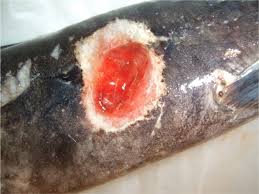A press statement has been issued by the Ministry of Agriculture, a confirmed case of disease known as Epizootic Ulcerative Syndrome (EUS) in fish has been confirmed at Dambo village, Mloyeni Extension Planning Area (EPA) in Mchinji district withing Kasungu ADD. The disease has also spread to other water bodies in Mchinji.
The EUS disease is said to be a highly contagious fungal disease that mostly affects water fish and it has devastating socio- economic consequences which include disruption of massive aquatic species diversity as a result of massive fish mortalities, reduced livelihood of subsistence and commercial fishermen. The disease results is low or no income that come from fish, generally reduced fish protein intake and risk on the ban of fish exports which will affect the national GDP’s contribution from fish if they are not timely controlled.
EUS causes deep ulcers, some opportunistic bacteria can invade the wounds and if a person eats the infected fish, diseases like diarrhea may occur especially in children and other vulnerable groups.
Preliminary investigation conducted so far indicates that the disease has almost affected the entire district of Mchinji and infinite number of fish is at a high risk. However, detailed investigations are still underway to establish the magnitude of spread and map the extent of the problem.
A press statement has been issued by the Ministry of Agriculture, a confirmed case of disease known as Epizootic Ulcerative Syndrome (EUS) in fish has been confirmed at Dambo village, Mloyeni Extension Planning Area (EPA) in Mchinji district withing Kasungu ADD. The disease has also spread to other water bodies in Mchinji. The EUS disease is said to be a highly contagious fungal disease that mostly affects water fish and it has devastating socio- economic consequences which include disruption of massive aquatic species diversity as a result of massive fish mortalities, reduced livelihood of subsistence and commercial fishermen.
The disease results is low or no income that come from fish, generally reduced fish protein intake and risk on the ban of fish exports which will affect the national GDP’s contribution from fish if they are not timely controlled.
EUS causes deep ulcers, some opportunistic bacteria can invade the wounds and if a person eats the infected fish, diseases like diarrhea may occur especially in children and other vulnerable groups.
Preliminary investigation conducted so far indicates that the disease has almost affected the entire district of Mchinji and infinite number of fish is at a high risk. However, detailed investigations are still underway to establish the magnitude of spread and map the extent of the problem. A press statement has been issued by the Ministry of Agriculture, a confirmed case of disease known as Epizootic Ulcerative Syndrome (EUS) in fish has been confirmed at Dambo village, Mloyeni Extension Planning Area (EPA) in Mchinji district withing Kasungu ADD. The disease has also spread to other water bodies in Mchinji. The EUS disease is said to be a highly contagious fungal disease that mostly affects water fish and it has devastating socio- economic consequences which include disruption of massive aquatic species diversity as a result of massive fish mortalities, reduced livelihood of subsistence and commercial fishermen.
The disease results is low or no income that come from fish, generally reduced fish protein intake and risk on the ban of fish exports which will affect the national GDP’s contribution from fish if they are not timely controlled.
EUS causes deep ulcers, some opportunistic bacteria can invade the wounds and if a person eats the infected fish, diseases like diarrhea may occur especially in children and other vulnerable groups.
Preliminary investigation conducted so far indicates that the disease has almost affected the entire district of Mchinji and infinite number of fish is at a high risk. However, detailed investigations are still underway to establish the magnitude of spread and map the extent of the problem











































